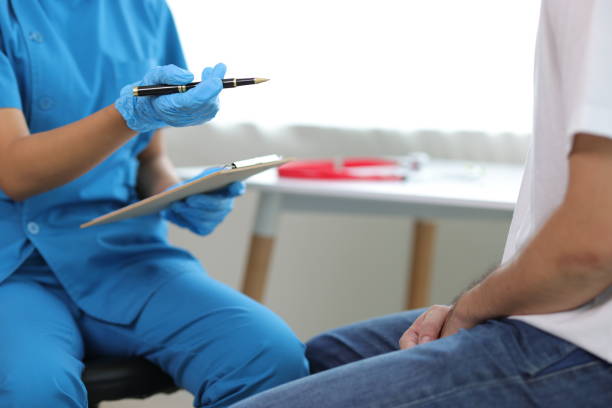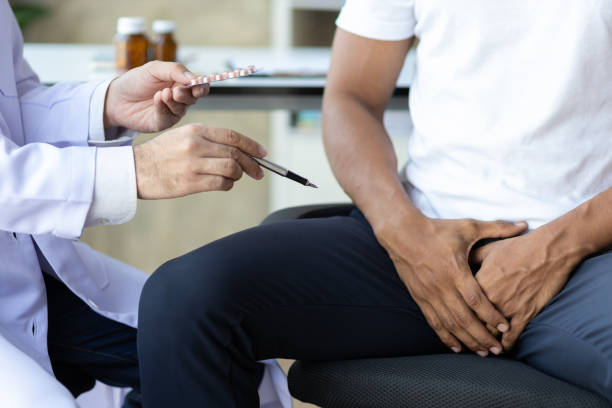What Is Erectile Dysfunction and Why Is It So Common?
Erectile dysfunction (ED) is when a man has trouble getting or keeping an erection firm enough for sex. It’s more common than many people think. In fact, according to the Cleveland Clinic, ED affects about 1 in 10 men at some point in their lives. That means millions of men deal with this issue—but many stay silent about it.
Many men feel embarrassed when they deal with ED. They may worry that something is wrong with them or that they’re the only ones struggling. But the truth is, you’re not alone—and it’s not your fault. Erectile Dysfunction can happen for many different reasons, both physical and emotional. Some of the most common causes include:
- Stress or anxiety
- Poor blood flow to the penis
- Diabetes
- Low testosterone levels
- Side effects from medication
- Unhealthy habits like smoking, poor diet, or heavy alcohol use
Even young men can experience Erectile Dysfunction if their lifestyle or health is off balance. That’s why it’s important to understand what’s going on and take steps to address it.
The good news? Erectile dysfunction is treatable. With the right help, most men can improve or even fully recover. Whether it’s through lifestyle changes, therapy, medication, or other medical treatments, there are many ways to take back control. There’s no reason to suffer in silence—help is available.
The Shame Around ED: Why Men Struggle to Speak Up
Talking about Erectile Dysfunction can feel uncomfortable. Many men were raised to believe that talking about sexual health is a sign of weakness. Some grew up in homes or cultures where these topics were never discussed. Others feel pressure to always perform and worry that admitting to ED means something is “wrong” with them. But staying silent can make things worse, both emotionally and physically.
Why Men Stay Quiet
- Fear of being judged or laughed at
- Worry about disappointing a partner
- Embarrassment at the doctor’s office
- Belief that it’s a “normal” part of aging
Some men even think that nothing can be done, so they keep it to themselves. But this silence can lead to stress, low self-esteem, and even problems in relationships.
But here’s the truth: Erectile Dysfunction is a health issue, just like high blood pressure or back pain. It can affect your quality of life, but it doesn’t define your worth as a man. It’s not a sign of weakness or failure. It’s a medical condition—and getting help is a smart and strong choice.

How to Overcome Embarrassment About ED
Confidence starts with understanding that you’re not alone. Millions of men deal with erectile dysfunction, and talking about it is the first step toward finding real solutions. You don’t have to feel ashamed or embarrassed. Erectile Dysfunction is common—and more importantly, it’s treatable. Opening up can help you feel more in control and less isolated.
1. Educate Yourself First
Learning about ED can help ease the fear. When you know what’s happening in your body and why, you feel more in control.
Great places to start:
- Mayo Clinic – Erectile Dysfunction Overview
- National Institute of Diabetes and Digestive and Kidney Diseases
2. Start the Conversation With Someone You Trust
This could be your partner, a friend, or your doctor. You might say:
- “I’ve been dealing with something that’s affecting my confidence.”
- “I want to talk about my sexual health.”
- “I think I might have ED, and I need some advice.”
Most people will respect your honesty. Talking about it is often the hardest—and most freeing—step.
3. Reframe How You See ED
Instead of thinking of Erectile Dysfunction as a failure, think of it as a signal. Your body may be telling you something, like:
- Your stress levels are too high
- You need to improve blood flow
- You may have an underlying health condition
Seeing ED as a health alert, not a personal flaw, can change how you feel about it.
Talking to Your Partner: Tips to Keep the Conversation Positive
Erectile Dysfunction doesn’t just affect you—it can affect your relationship too. But a strong partnership can be part of the healing process.
How to Talk to Your Partner
- Be honest but gentle: “I’ve noticed some changes, and I want to talk about them.”
- Focus on teamwork: “Let’s figure this out together.”
- Avoid blame: ED is not about attraction or love—it’s a medical issue.
What Your Partner Might Be Thinking
Your partner may feel confused, rejected, or even think they did something wrong. By opening up, you give them the chance to support you—and feel included.

Medical Treatments That Work for ED
You don’t have to “just live with it.” Many treatments can help restore erections and improve confidence.
1. Oral Medications
Drugs like Viagra (sildenafil) or Cialis (tadalafil) are common and effective. These medications are known as PDE5 inhibitors. They work by improving blood flow to the penis, which helps you get and keep an erection when you’re sexually aroused.
They don’t cause automatic erections and won’t increase sexual desire—but they can make it easier to have sex when the moment is right. These pills usually start working within 30 to 60 minutes and can last for several hours, depending on the type.
Talk to your doctor to see if these are right for you. Not everyone can safely take ED medications. Your doctor will check your overall health, look at your other medications, and help you decide the best option. If pills aren’t a good fit, there are other treatments available too.
2. Lifestyle Changes
Simple changes can have a big impact. Your daily habits play a big role in your sexual health. Making better choices doesn’t just help with Erectile Dysfunction—it can improve your energy, mood, and long-term health.
Try these healthy habits:
- Quit smoking
Smoking damages blood vessels and reduces blood flow, which can make ED worse. Quitting can improve circulation and boost your overall health. - Exercise regularly
Just 30 minutes of walking or light activity a day can improve blood flow and lower stress. Exercise also helps you feel stronger and more confident. - Eat a heart-healthy diet
Foods like fruits, vegetables, whole grains, and lean proteins help your heart and your erections. What’s good for your heart is good for your sex life. - Limit alcohol
Too much alcohol can interfere with your ability to get or keep an erection. Try to drink in moderation, or not at all. - Reduce stress
High stress levels can mess with your hormones and blood flow. Deep breathing, meditation, or talking to a therapist can help you relax.
These habits not only help Erectile Dysfunction—they also boost overall health. Small steps each day can lead to big results over time. And the best part? You’re improving your life in more ways than one.
3. Therapy for Mental Health and Erectile Dysfunction
If anxiety, depression, or relationship stress is part of the issue, therapy may help. Mental health plays a big role in sexual performance. Feeling anxious or down can make it harder to get or keep an erection, even if there’s no physical problem. In some cases, the fear of ED can actually cause more ED.
Cognitive behavioral therapy (CBT) is especially effective. CBT helps you identify negative thoughts and replace them with healthier ones. It teaches coping skills, lowers stress, and builds confidence in the bedroom and beyond.
The American Urological Association also recommends combining medical and psychological support for best results. This means that using medication along with therapy can be more effective than either one alone. Treating both the mind and body gives you the best chance at lasting improvement.
4. Devices and Other Treatments
Other options include:
If pills or lifestyle changes don’t work, there are other proven treatments for ED. These methods can be safe and effective, depending on your needs.
- Vacuum erection devices (penis pumps)
These devices use suction to pull blood into the penis. Once an erection is achieved, a ring is placed at the base to keep it firm during sex. It’s drug-free and can be used as needed. - Penile injections
Medication is injected directly into the penis to trigger an erection. The results are often quick and reliable. It may sound scary, but many men find it easy after some practice. - Testosterone therapy (if levels are low)
Low testosterone can cause or worsen ED. Blood tests can check your hormone levels. If they’re low, testosterone therapy might help restore sex drive and improve erections. - Surgery (in rare cases)
If other treatments fail, surgical implants can provide a long-term solution. This option is usually for men with severe ED that doesn’t respond to other treatments.
Your doctor can walk you through what’s best based on your health and goals. Everyone is different, and the right treatment depends on the cause of your ED, your overall health, and your personal preferences.
Natural Remedies: Do They Help?
Some men prefer natural options. While these should never replace medical advice, a few supplements show promise:
- L-arginine
- Panax ginseng
- DHEA
- Yohimbe (use with caution—may have side effects)
Learn more from the National Center for Complementary and Integrative Health.
Always talk to a healthcare provider before starting supplements.
Boosting Self-Esteem While Managing Erectile Dysfunction
Dealing with Erectile Dysfunction can affect how you see yourself. But confidence isn’t only about what happens in the bedroom.
Tips to Build Self-Worth
- Set small fitness goals and celebrate them
- Practice positive self-talk: Remind yourself of your strengths
- Dress well: It’s a small thing that can boost your mood
- Stay social: Isolation can worsen embarrassment
ED does not define you. You are more than your erections.

When to See a Doctor (And What to Expect)
If Erectile Dysfunction lasts more than a few weeks or keeps coming back, see a doctor. Here’s what may happen:
What Your Doctor Might Ask
- When did symptoms start?
- Do you wake up with erections?
- Are you taking any medications?
- Do you feel anxious or stressed?
Tests You May Get
- Blood pressure and cholesterol tests
- Blood sugar check (for diabetes)
- Testosterone levels
- Physical exam
Getting help early can prevent more serious health issues in the future.
You Are Not Alone: Famous Men Who’ve Faced ED
ED isn’t just a “regular guy” problem. Celebrities and athletes have talked about it too.
For example:
- Former NFL players have spoken about ED after concussions and stress.
- TV personalities like Dr. Drew have helped raise awareness by discussing it openly.
The more we talk about ED, the less shame there is around it.
Ready to Take the First Step?
Don’t let embarrassment keep you from the help you deserve. Talk to your doctor. Open up to your partner. You have nothing to be ashamed of—and everything to gain.
Start your journey today. Your health, confidence, and relationships matter.

